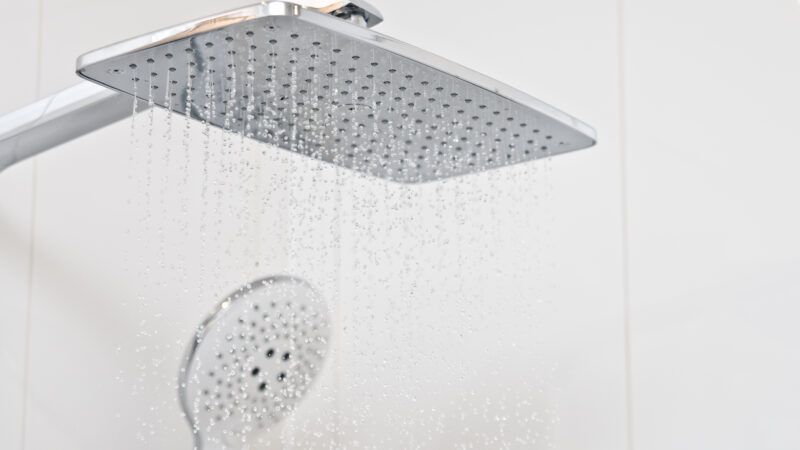Trump Slashed Regulations That Stopped Americans From Having a Good Shower. Biden Is Bringing Them Back.
Environmentalists criticized Trump's reforms for wasting water, while showerhead manufacturers worried the deregulation would subject them to more foreign competition.

Under pressure from environmentalists, the Biden administration is putting some stricter energy efficiency regulations in place. On Friday, the U.S. Department of Energy (DOE) announced that it would be reversing a short-lived Trump administration rule that eased restrictions on the pleasing flow of multi-headed showers.
The root of this dispute goes back to the Energy Policy and Conservation Act, a 1992 law which imposed a host of convenience-crushing energy efficiency regulations on appliances. Chief among them was a requirement that showerheads sold in the U.S. emit no more than 2.5 gallons of water per minute.
Former President Donald Trump was a frequent critic of both this regulation and Obama-era regulatory changes in 2011 and 2013 that required whole shower units to comply with the 2.5-gallon-per-minute limit. Previously, multi-headed shower units could emit more water so long as each individual showerhead didn't surpass 2.5 gallons-per-minute.
"I build, and I build a lot of stuff. And I go into areas where they have tremendous water… And you have sinks where the water doesn't come out…. You have showers where I can't wash my hair properly, it's a disaster!" said then-candidate Trump at a 2015 rally.
It's a complaint that Trump re-upped multiple times during his tenure in the White House. It wasn't until December 2020, however, that his DOE undid the Obama administration's restrictions, letting multi-headed showers flow freely again.
The Biden administration has now proposed to undo this important win for individual liberty.
"As many parts of America experience historic droughts, this commonsense proposal means consumers can purchase showerheads that conserve water and save them money on their utility bills″ said a Department of Energy spokesperson to the Associated Press on Friday.
Of course, Americans could still purchase water-conserving showerheads under the Trump administration's rule. The Biden administration would just force them to do so.
The changes that Trump imposed in 2020 were not without controversy. Environmental groups and water districts complained that easing restrictions on showerheads would result in more water use, and thus wasted water and energy.
Industry groups representing showerhead manufacturers also complained about the changes, citing the money they'd already spent complying with the existing rules and expressing concern that any changes would open them up to more foreign competition.
The Trump administration's proposed changes would "negate significant investment costs the industry has taken to comply with the existing DOE regulations and guidance" and create a "potential competitive disadvantage for U.S. manufacturers who have developed products to comply with the current requirements," said the American Supply Association, a trade group, in a public comment in October 2020.
If regulations did allow multi-headed shower units, "some manufacturer out there will make them and will probably garner some markets share," says Ben Lieberman, a senior fellow at the Competitive Enterprise Institute. "From the perspective of manufacturers who are now making the compliant models, they see nothing to be gained by allowing the heavier flow models onto the market."
When the Obama administration first proposed its more restrictive standards for showerheads in 2010, manufacturers got pretty steamed.
"Leave my shower alone," said one showerhead seller to The Wall Street Journal. "It was not the legislative intent of Congress to authorize DOE to regulate the bathing habits of Americans," said another manufacturer.
What a difference 10 years and millions spent on compliance costs makes.
Once the Biden administration's new proposed rule is published in the Federal Register, the public will have 60 days to comment. A final rule will come down sometime after that.
